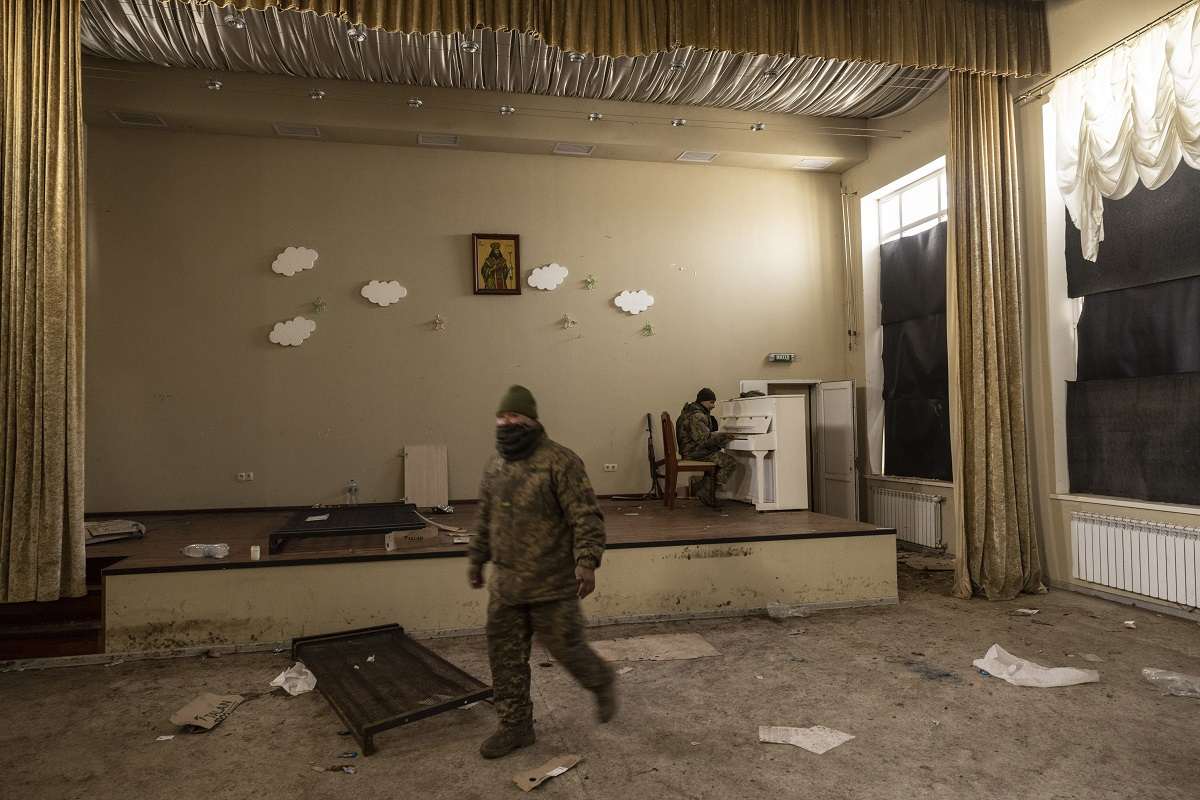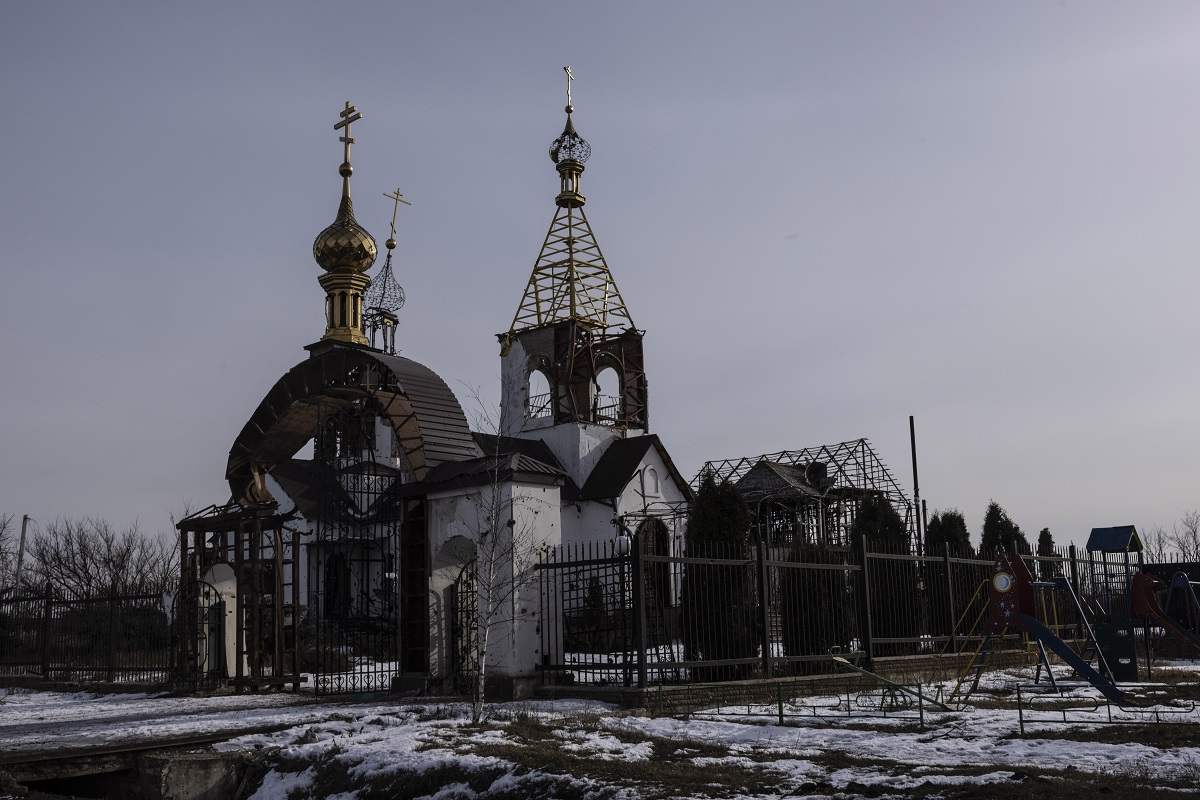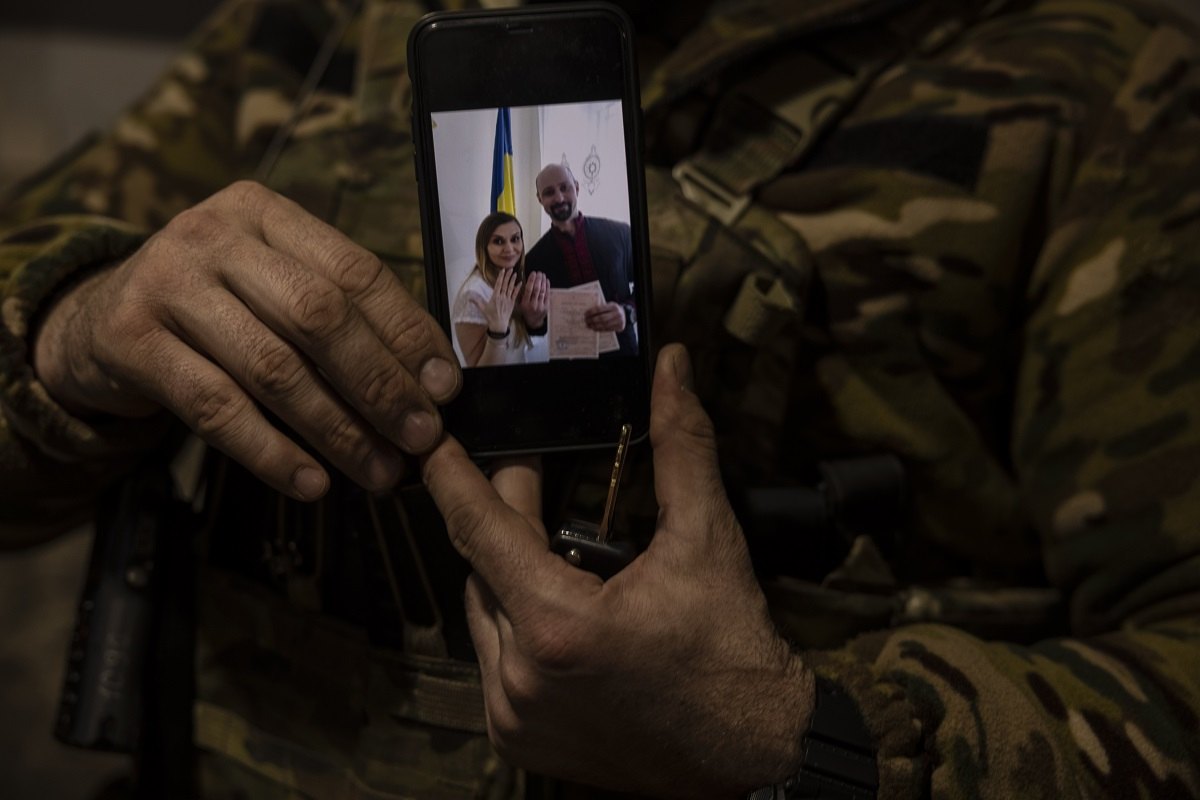
Jon Freedy, a member of the Carpathian Sich 49th Infantry Battalion from Colombia, plays Happy Birthday on the first anniversary of the Russian invasion of Ukraine Friday in a bombed-out church in the country’s Donetsk region. His weapon leans against the wall next to him.
15:07 JST, February 25, 2023
DONETSK REGION, Ukraine – On his 366th day of war, Sgt. Volodymyr Rusyn reached the most dangerous part of his route to the front lines: A 20-yard, don’t-slow-down, cratered stretch of road that is shelled regularly – sometimes hourly – by Russian batteries stationed less than two miles away.
He found it blocked by a military truck.
“This is the worst place to stop,” he muttered, tapping the steering wheel, eager to run the gantlet and get on with his mission. As the deputy commander of the Carpathian Sich 49th Infantry Battalion, Rusyn visits his front line trench fighters, tank drivers and medics every day. But this day is special; it’s an anniversary.
Not the first anniversary of the war that’s being marked from Kyiv to Washington. His wedding anniversary. On the morning of Feb. 24, 2022, he was married, hours after getting the early-morning phone call that Russia had invaded.
“I woke up my girlfriend and said, ‘We need to get married,'” said Rusyn, 39. “I knew I would be going away for a long time.”
By 10 a.m. he was saying his vows. By 10 p.m. he was on a train to Kyiv, where the battalion would spend weeks defending the capital from the invaders. For the newlyweds, married life during wartime has meant exactly 30 days together – three 10-day furloughs – as the battalion has pursued the fight from Kyiv to Kharkiv to Donetsk.
Now, after his battalion helped pushed the Russians out of Lyman in September, they are fighting to keep them from taking it back. A year has been long enough for the tide of war to ebb and flow, and he knows Moscow is keen to reoccupy the semi-demolished city where he sleeps in an abandoned house.
But this day was special. Rusyn was waiting for a friend in western Ukraine to surprise his wife with flowers and – because the 12 hours between the wedding and his mobilization a year ago were enough to create the child they yearned for – with gifts for the daughter that was born in October.
He raced along the moonscape of a road, one of the closest to Russian-occupied territory. He didn’t know when the surprises would arrive, or whether Moscow would mark the war anniversary with an attack on his troops’ positions. But in any case, he had to see his fighters.
He zoomed along a lane of shelled houses, splashing through craters filled with melting snow. A bundled elderly woman watched him pass. Rusyn looked into his rearview mirror warily. A year of war that has killed 72 members of his battalion and wounded more than 300 others has made him more suspicious, especially in this area, of Russian sympathizers.
“You can see a grandma and she just looks like a simple grandma but in fact she may tell the enemy about Ukrainian positions,” he said.
That morning, he had left a rear base where battalion fighters were taking a breather from front line rotations. It was a day of rest – not for the anniversary but because they had just come off three-day turns in the trenches. One played Happy Birthday on a piano in a bombed-out church. A volunteer nurse from Riga boiled tea water in a metal cup atop a wood-burning stove.
Whatever their lives had been before, they were seasoned soldiers now.

A church damaged in the fighting in the Donetsk region.
“A lot of my friends thought this would be over in two or three days when Russia captured the entire country,” said Eney, 51, who spoke on the condition that he be identified only by his radio call name. Born here, he had lived in Spain 20 years when he left his wife and a job delivering bread in Bilbao to spend “as long as it takes” to kick the Russians out.
It was noisier at the forward base, in a village The Washington Post is not identifying to safeguard the location of combatants. Explosions shook the walls of headquarters, an abandoned building filled with laptops, munitions, boxes of bread and Jessi, the unit terrier.
A bigger, closer boom sounded.
“What was that, Volodymyr?” the battalion administrator asked. A public relations staffer for a Kyiv biotech company in civilian life, Vasylyna, 31, has lived in this shelter for three months, but she still can’t always tell mortars from rockets from shells.
Rusyn didn’t look up from his phone. A Starlink satellite unit makes this a precious internet hotspot.
“Artillery. Incoming,” he said.
Vasylyna, who spoke on the condition that her last name be withheld, had noted the anniversary as soon as she woke up in her room next to the command center. “For one year we have been cleansing Europe of this evil,” she wrote on social media.
Now she was sorting out anniversary tokens of a sort, metal badges stamped with the battalion logo on one side and each fighter’s name, and blood type, on the other. Rusyn would pass them out to small groups after the day is passed and the risk of an anniversary attack has eased.
“We don’t let more than 10 or 20 people gather because they might be a target,” Vasylyna said. Two tank drivers arrived and stamped mud from their boots. Vasylyna plugged her laptop into a printer to scan documents for them.
At the next front line location, Rusyn picked his way over bricks and glass blasted loose by four Grad rocket blasts and made his way into a hidden alcove used as a medic station.
The four-person team sometimes treats 30 casualties a day in this dark space. The many serious patients they send straight to a stabilization clinic, but here they treat many concussions, contusions and frost bite. Rusyn checked on a broken leg that showed complications after the fighter ignored the pain for three days in a trench.
The roof of the building was recently blown off, but the staff still lives here, on a lower level.
“The Russians definitely know our positions here,” said “House,” a medical student who was one exam away from his M.D. when he joined the fight. He spoke on the condition that he be identified by his radio call handle. “It’s just a question of time.
The deputy commander’s last stop was at a location where some heavy armor is stationed. The battalion had no mechanized units until they began taking them from the enemy. Now one of their tank teams greets him in the living room of yet another abandoned house where a kettle boiled cheerily, and a speckled cat wound through their legs.
“I think we need a new generator,” one told Rusyn. The deputy commander nodded. “Tell me what you need and I’ll get it here.”
Outside, troops started a modern Russian T-80 captured near Izyum to warm the battery in the freezing air. It roared like a jet engine. It’s a far more complex machine than the Soviet-era tanks making up most of the Ukrainian armament.
No one here – an electrician, geologist and lamp maker among them – had any tank or even heavy equipment experience a year ago. Now, they have dozens of hours on the battlefield, fighting Russians with their own war machines.
“I’m a completely different person than I was a year ago,” said the tank commander, a 25-year-old warehouse manager who goes by Sueta.
Finally, in the middle of his rounds, Rusyn’s phone rang. It was his wife. She was crying.
“I just got internet connection,” Rusyn said. “You got the flowers?”
It was for a moment, after an unimaginable year, a happy anniversary.

Sgt. Volodymyr Ruysn shows a wedding photo on his cellphone. He and his girlfriend were wed on the day Russia invaded Ukraine, so it was their anniversary, too.
Top Articles in News Services
-

Survey Shows False Election Info Perceived as True
-

Hong Kong Ex-Publisher Jimmy Lai’s Sentence Raises International Outcry as China Defends It
-

Japan’s Nikkei Stock Average Touches 58,000 as Yen, Jgbs Rally on Election Fallout (UPDATE 1)
-

Japan’s Nikkei Stock Average Falls as US-Iran Tensions Unsettle Investors (UPDATE 1)
-

Trump Names Former Federal Reserve Governor Warsh as the Next Fed Chair, Replacing Powell
JN ACCESS RANKING
-

Producer Behind Pop Group XG Arrested for Cocaine Possession
-

Japan PM Takaichi’s Cabinet Resigns en Masse
-

Japan Institute to Use Domestic Commercial Optical Lattice Clock to Set Japan Standard Time
-

Man Infected with Measles Reportedly Dined at Restaurant in Tokyo Station
-

Israeli Ambassador to Japan Speaks about Japan’s Role in the Reconstruction of Gaza























